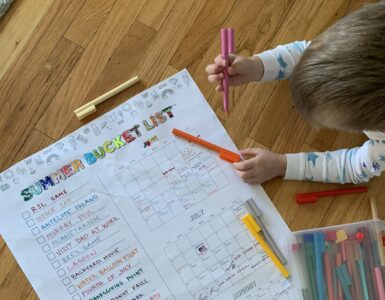Life coach and Studio 5 Contributor, Fatima Doman helps moms stop multi-tasking.
Multi-tasking impairs judgement and response time: You wouldn’t drink and drive. But would you drink before writing an important e-mail or making an important phone call? It sounds absurd, but strong evidence suggests multitasking reduces performance to the level of being drunk. Research shows cell phone talkers are half a second slower to hit the brakes in emergencies, miss more than 50% of the visual cues spotted by attentive drivers and get in more wrecks than anyone except very drunk drivers. A productivity study at Hewlett Packard found that the average worker’s functioning IQ, drops 10 points when multitasking. That’s more than double the 4 point drop when someone smokes marijuana.
Multi-tasking vs. background tasking: Multitasking is often seen as a skill to be cultivated–multitaskers are admired for their efficiency. However, multi-tasking, when it comes to paying attention, is a myth. Research shows that we cannot pay attention to two things at once. Have you ever driven to work while talking on the phone, and when you arrived you could hardly remember the drive? Multi-tasking does not refer to doing something mindless or mundane in the background such as exercising and watching tv. That’s called “background tasking”. Multi-tasking is performing two or more things that require mental effort and attention, i.e. spending time with family and checking e-mail. Multi-tasking is poor energy management, because you’re not fully engaged in anything, and you are partially disengaged in everything.
The cost of interruptions: Research shows that people who are interrupted—having to switch their attention back and forth—take 50% longer to accomplish a task, and make up to 50% more errors. The productivity lost by overloaded multitaskers and interruptions is estimated to cost the American economy nearly $650 billion a year. Ever been in a deep discussion with a friend over lunch, then the waiter interrupts to take your order, and when he’s gone neither of you can remember what you were talking about?
How men and women differ: No offense to all you men out there, but psychologists have proven that women really are better than men at multi-tasking. Researchers found that when women and men work on a number of simple tasks—such as searching for an object and doing easy math problems at the same time, women significantly outperformed men. Moms tend to multi-task because they have to. They rarely have the luxury to do just one thing at a time, so they have learned how. Many moms often make dinner, play with a child and answer the phone all at the same time. However, our children can tell if we are not really paying attention to them, if we’re distracted. When my son Sage has something important he wants me to focus on he holds my face and says, “mom listen to me”. Men on the other hand seem to better screen out distractions and laser focus—think how hard it is to get your husband’s attention while he’s reading the newspaper.
If multi-tasking is unproductive, what does a high performance state look like: Famous psychologist Mihaly Csikszentmihalyi has studied what he calls a “flow state”. Flow is a state of consciousness experienced during peak performance. It is characterized by pleasure, clarity, serenity, timelessness and focus. Athletes often call it being in the “zone”. All peak performers know the importance of being in flow. During flow we are completely involved in what we are doing–fully present in the moment. We can enable flow by setting aside focused chunks of time—an hour or two each day. No meetings, telephones—just concentration. Clear a space where you can focus without distractions. This could really boost your productivity. Also, maximize your performance through self care, such as good nutrition, exercise, rest and especially relaxation.
The Buddha said it beautifully: “When you are walking, walk. When you are sitting, sit.” It would serve us well to learn to be present in the moment—we would enjoy life much more that way! We can do this by practicing mindfulness (I use self talk, “Fatima, be here now”), meditation/prayer (trains the mind to concentrate on positive things), deep breathing exercises (very calming), and visualization (many athletes visualize the race as a way to get in the zone). All of these have proven track records because of their ability to reduce stress, clear the mind and increase concentration.
I ask my clients these Coaching Power Questions:
When do you feel most connected in your relationships?
When are you most focused at work?
What strategies help you be present in the moment?
Fatima Doman is passionate about coaching others to succeed and in addition to her work with Franklin Covey, runs Ascend Coaching, her personal coaching business.
You can contact Fatima at (435)513-5331















Add comment